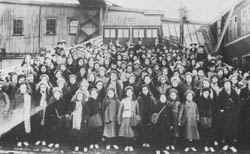Every September 28th Canada celebrates British Home Child Day. Between one and two hundred thousand children were sent to Canada from England between 1869 and 1948 to be used as free farm and domestic labour. Some making the lonely voyage were orphans, but most were born to desperately poor parents in a cruel and uncaring industrial revolution. An inability to feed all of their children and hard-drinking fathers were factors. While modern sensibilities recoil at such shockingly harsh treatment of young children, it was par for the course in a much less privileged time.
Barnardo children were named after Dr. Thomas Barnardo. He founded the Barnardo Foundation, which organized the gathering of London’s poor children to be shipped out to Canada. This was a time when a belief in eugenics was strong. These very poor English children were regarded as coming from inferior racial stock.
The boys were routinely sent West with cardboard signs hung around their necks advertising the free labour they offered. How many of the boys were badly exploited by farmers who hired them as indentured servants, or how many girls were misused in various ways in the households where they laboured is not known. Many suffered lifelong effects. Children as young as 7 were forced to raise themselves without the nurture and love of their parents. It is not surprising that many lived troubled lives as adults.
Before a 1925 law freed them at age 14, it was considered perfectly normal for young home children to be worked mercilessly until they turned 18, then released from their indentures. While some were lucky enough to find homes where they were treated well and went on to become productive citizens, a great number were exploited, carrying stigma and rough treatment to the grave. Many Canadians have a home boy or girl as one of their ancestors.
In the latter half of this forced emigration, a philanthropist, Kingsley Fairbridge, established a farm school to provide some education and training. The Fairbridge Farm School operated in British Columbia for many years, regarded as a progressive step and supported by notables as Agnes MacPhail and Rudyard Kipling. Yet, the school didn’t escape sexual abuse and closed under a cloud. Fairbridgians and their descendants still meet to remember their residential school experience.
With the home children, publicizing their victimization to achieve monetary awards was not pursued. And, the home children were removed permanently from their parents, most never attended school at all. The children were used as free farm and household labour and often abused. Why? Most of them chose to remain quiet; it was not money they were after – just awareness and a little recognition.
On February 17, 2017, almost 150 years after the first home child arrived in Canada, Parliament granted the home children’s modest request by declaring September 28th a day in their name.
Every September 28th, we should take a moment to think about the home children.
Brian Giesbrecht, a retired judge, is a senior fellow with Frontier Centre For Public Policy.



